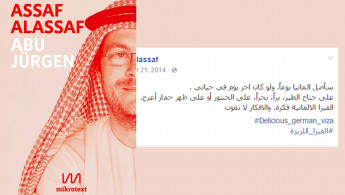How Twitter helped Syrian dentist gets German visa
For months now, the media and social media have been rife with bleak stories about Syrian refugees looking for a better life away from their war-torn country. But the story of Assaf al-Assaf gives a pleasant twist to the bleakness.
Assaf al-Assaf shared his story with al-Araby al-Jadeed. The idea of starting a hashtag that would forever change his and his family's life came to him two years after he travelled to Lebanon.
His enthusiasm for permanently settling there had started to dampen, because of strict Lebanese employment and residency laws.
When the wave of migration to Europe via the sea started gaining steam, Assaf felt it was time to think seriously about travelling, instead of waiting for his turn to come with the UNHCR re-settlement programme.
| Assaf started posting his musings on his Facebook page, with the hashtag #Delicious_german_viza |
Assaf told al-Araby al-Jadeed that he chose Germany because it is a big country with a strong economy and good labour market. He says he believed he would have a good chance to find work there as a dentist.
Assaf started posting his musings on his Facebook page, with the hashtag #Delicious_german_viza and a matching one in Arabic.
The posts gathered a decent following. Assaf mixed humour with serious issues, and by sheer coincidence, Sandra Hetzl, a German translator of Arabic, learned about Assaf from her friends.
She was immediately impressed and helped turn the posts into a book project that ultimately received endorsement from the Heinrich Boell Foundation in Germany.
A few days ago, the book was published as an e-book with a paperback in the works. The book is titled "Abu Jurgen, My Life with the German Ambassador." Assaf says he proposed the sarcastic title for marketing reasons.
Abu Jurgen's spectacular feat
The translator and publisher showed some of the texts to cultural institutions in Germany. Soon enough, Assaf received invitations to speak about the book when it is published.
Assaf also received grants from two theatres in Germany with support from the Goethe Institute. Preparations began to fly him and host him in Germany, and recently, he obtained a visa to travel.
Assaf says sarcastically: "My mother and father say it is their prayers that got me the visa, and my friends say it is the translator and publisher. I say it is the likes from friends and followers on Facebook."
Assaf stresses that he did not apply for asylum at any embassy. He said that if the hashtagh had not gone viral, his options would be similar to those of the Syrians stuck in limbo, especially since he has a wife and two children.
Assaf points out that if the "miracle" had taken longer, illegal migration could possibly have become an option.
"I hope that the book will shine some light on the issue of the refugees, by mocking the idea of the visa itself and the bureaucracy and obstacles placed by states on asylum-seekers," Assaf says.
He wants his work to help legitimize migration, and find alternatives to fleeing by bloat, smuggling and unsafe migration routes, because most people are looking for a new place to preserve their dignity, as he says.
This is an edited translation from our Arabic edition.





 Follow the Middle East's top stories in English at The New Arab on Google News
Follow the Middle East's top stories in English at The New Arab on Google News


